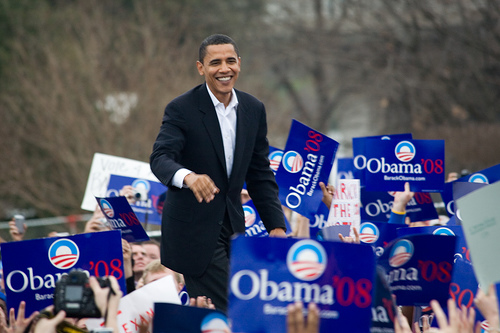Obama's Self-Destructive Optimism

A simple theory of why Obama didn't come out fighting in 2009: he expected an economic turnaround in four years.
My co-bloggers John Sides and Josh Tucker responded yesterday to a recent newspaper article in which psychologist Drew Westen argues that Barack Obama made a mistake by making conciliatory noises rather than aggressive Wall-Street-blaming in his inauguration speech and after.
Westen argued that had Obama set up a narrative with clearly defined bad guys, he would've had more success in policy and public opinion. John and Josh argue that (a) it's results, not rhetoric, that sway public opinion, and (b) if anything, aggressive rhetoric just makes it harder to achieve the sorts of cross-party alliances that a president needs to have policy successes.
I have a slightly different reaction, in two parts:
1. It's probably unrealistic to suppose that Obama would have led off his presidency with a speech attacking Wall Street. Obama is probably the last politician you'd expect to attack these guys. First off, in 2008, Obama was the preferred candidate of Wall Street--they were a big source of his campaign contributions and he supported the bailout. At the same time, I think many on Wall Street never really trusted Obama and were on the lookout for signs that he was really a left-wing redistributionist.
Someone on the left wing economically could attack Wall Street every day--he'd have nothing to lose--and a right-wing politician could slam Wall Street as well, they might recognize it as cheap talk. But a president who is paid for by financial types who don't fully trust him--he's in the worst possible position to make that rhetorical move.
2. More to the point, I don't think that in January, 2009, Obama had any feeling he was in trouble. For one thing, he'd spent the previous two years beating the odds and winning the presidency. (Yes, a Democrat was favored in the general election, but Obama was only one of several Democrats running.) As I and others have discussed many times, successful politicians have beaten the odds and so it is natural for them to be overconfident about future success.
But, getting back to the big issues facing the voters, I assume that Obama figured that the economy would bounce back in 4 years. I suspect his model was Reagan in 1981-1984. Who could imagine, back in 2009, that the economy would still be in the dumps in 2011? Paul Krugman, maybe, but he wasn't making policy. (One big difference was that Reagan faced a Congress full of Republicans who wanted tax cuts and Democrats who wanted economic stimulus, and every step of legislative fighting led in the direction of economic expansion. It didn't work that way for Obama.)
If you accept the hypothesis that Obama came into office expecting an economic turnaround in four years, then everything makes sense. Why would he attack Wall Street in his inaugural address? No need to piss off the moneymen. Why be partisan? Better to pass moderate legislation with 70 or 80 votes in the Senate rather than fight to the death to get everything on the Democratic party's wish list. Long-term, the 2006 and 2008 elections gave a lot of people the impression that the Democrats would be in the driver's seat for awhile, so there seemed to be no rush.
Arguably the best advice for Obama would've been the opposite of Westen's. Maybe he should've been more bipartisan from the start and done what it took to get those 70-80 Senate votes on key issues. I don't know.
The key to Westen's and similar analyses is that Obama would be doing better now had there been a bigger, more effective stimulus package, and maybe Obama could've gotten there by more actively enlisting public opinion in early 2009. This might well be correct, but I don't think the Obama team had any sense that the economy was in such bad shape that this would be needed. And if they didn't feel that urgency, I can't see them turning on their friends on Wall Street.
Originally Posted at The Monkey Cage

